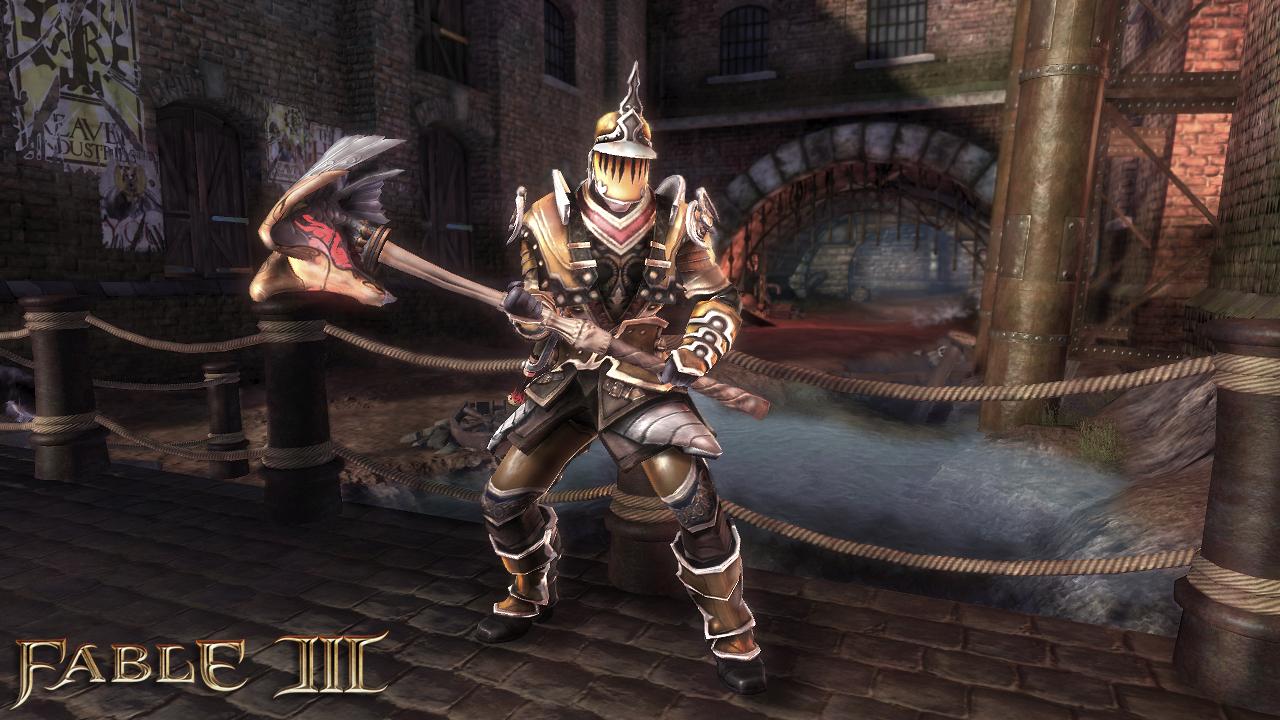Why you can trust GamesRadar+
These particular tough moral conundrums usually go something like this:

There’s a major plot development around this point which I won’t spoil, as it’s an absolute humdinger, but it ensures that your rule of Albion has to have a very tight, very frugal philosophy. Without giving too much away, the country’s economy is beyond important, but rarely ever will you be able to preserve it without turning into exactly the sort of person your mum would be disappointed to have brought up.
An innocent Albioner will make the case for the morally wholesome approach, while the financially healthy option is always sold with deliciously vile relish by actor, writer, comedian and all-round British national treasure Stephen Fry as the descendant of Fable II’s Reaver. It’s a testament to the quality of Lionhead’s writing and emotional engagement tactics, as well as Fry’s seductively foul delivery, that these decisions are so soul-twistingly hard to make. Rest assured, you may only be listening to a couple of speeches and pressing a button to pass judgement, but these moments are amongst the most stimulating and painfully engaging I’ve enjoyed in games in years.
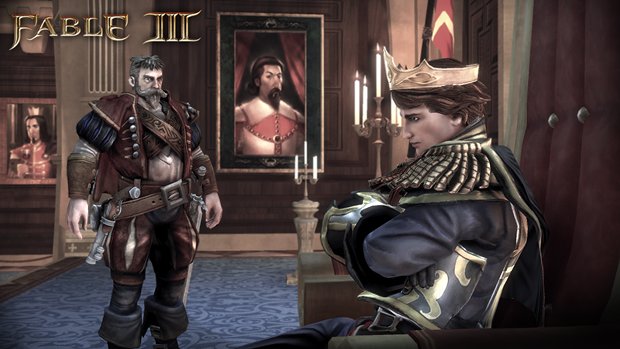
It sounds like Molyneux hyperbole, but for perhaps the first time in Fable’s history, the debates and rationalisation you put yourself through really will tell you a lot about who you are and where your moral lines are. And you’ll never be entirely comfortable with any decision you make, particularly given that every ruling has a very real, very tangible, and very permanent effect on the kingdom and its people.
Economic miscalculations
There is a potential design flaw though, and ironically it comes from the success of Lionhead’s emotional engagement. While the chief factor governing Albion’s prosperity will be your royal decision making, it’s also possible to transfer money between the treasury and your own personal stash at will. The idea is that a selfless player will make donations while a selfish one will take, but in practice it doesn’t really work.
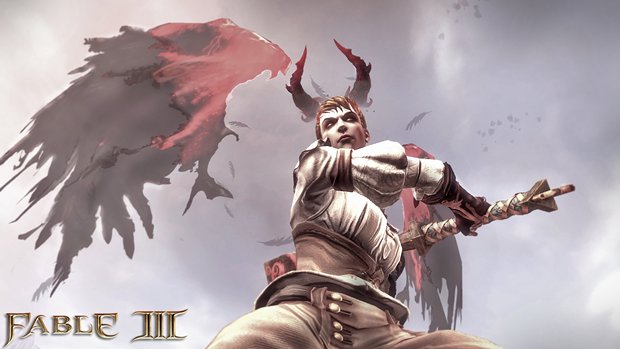
You see, if you’re anything like me, you’ll care so much about the good of the kingdom by this point that ripping off its people will be the last thing on your mind, given the inevitable guilt imparted by your rulings. And should you take the time to really build up a monster financial empire by purchasing businesses throughout the country (which isn't actually that hard, though it is highly time-consuming), you could in theory break the system by flooding the economy with your own cash. Though it could also be argued that doingso isjust a different way of playing a role in a game heavily focused around characterresponsibility.
Similarly, certain major treasure-hunting quests in the latter part of the game try to screw with you by giving you the option of keeping the spoils for yourself. I could only be speaking for myself here, but given the state of the story and your investment in Albion’s well-being at this stage, I find it unlikely that these particular moral quandries will bother many. That said, while most people play good by default in games like this, the multitude of options for manipulating Fable III’s end-game, and the multitude of outcomes, bothfor the eventual state of the country and to the various branching storylines along the way, give it a replay value certainly in excess of Fable II. In fact I can’t wait to get back in andstart all over again.
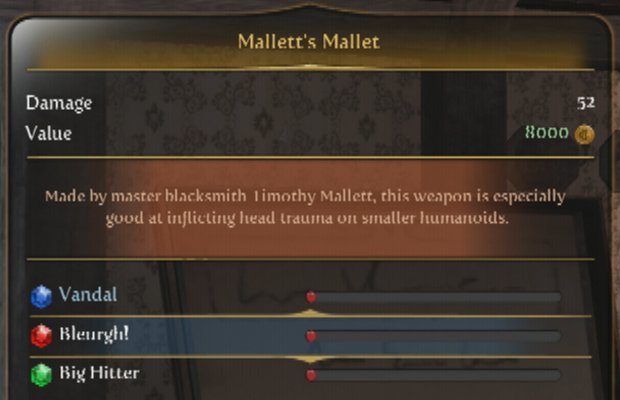
Above: If you don't get this excellent joke about mid-'80s British Saturday morning kids' TV, don't worry. You're most people
Other pros and cons? The quality of Fable’s impeccable writing, both in the main story and the multitude of optional side-quests, is higher than ever before. Albion really is one of the funniest, wittiest, most characterful places in gaming.And at timesit can also be one of the most darkly disturbing. The staggering voice cast, taking in luminaries from the likes of Lord of the Rings, Shaun of the Dead, Dog Soldiers, Spaced, and a stack of other great British dramas and comedies genuinely is one of the best in games to date.
Fable III is also arrestingly beautiful, Albion’s vibrant, tumbledown character rendered slightly sharper and cleaner than before, if susceptible to some pop-in, frame-rate shakes, and a strange ghosting effect at times. Nothing that’ll pull you out of the world though.
But on the subject of glitches,very occasionallythe golden breadcrumb trail which guides you around quests will lead you the wrong way, or switch off altogether, essentially leaving you stranded until it reactivates. And I had a couple of side-missions completely disappear from the quest list when switching, only to reappear later. Irritiating, but again, nothing that outweighs the many positives. And definitely patchable. So sort it out, Lionhead.
Is it better than...?
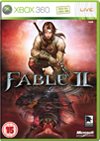
Fable II? Yes. The core, combat driven mission model hasn't really changed a huge amount (though fighting is now a little faster and punchier), but by stripping out some of Fable II's sillier charcter interaction excesses and upping the sense of attachment in subtle but clever ways, Fable III is a more satisfying, more grown-up experience. And now you finally get to understand the responsibility that comes with a quest for power.

The Legend of Zelda: Twilight Princess? No, but both games offer very different things. Zelda wins in terms of quest variety (its legendary puzzle-dungeons are just more engaging than Fable's hack-and-slash fests), but Fable III absolutely destroys TP in terms of creating a vibrant, living world you can genuinely have a affect on. And as sequels go, it adds more to its formula than Link's Wii outing does.

Fallout: New Vegas? I'm going to go out on a limb and say yes. Both are clever, funny and ambitiousopen-world RPGs which offer plenty in terms of side-quests and freedom, but Fable III's Albion is just a more beautiful andvibrant place to be. It might not have the scale of NV, but Fable III does add more interesting new twists to its predecessor. And less serious bugs.
Just for you, Metacritic!
Although Fable III's streamlined approach to the traditional Fable concept might feel a little odd to franchise veterans at first, this iteration is every bit as engaging and rewarding as its predecessors. Moreso, in fact, given that Lionhead's subtle but deeply effective changes to character and world interaction add such a tangible sense of attachment. Big, clever and funny, you'll rarely have enjoyed going through such punishing emotional torment.
More info
| Genre | Role Playing |
| Description | Third instalment of the flagship Xbox 360 RPG, first unveiled at Gamecom 09. |
| Franchise name | Fable |
| UK franchise name | Fable |
| Platform | "Xbox 360","PC" |
| US censor rating | "Mature","Mature" |
| UK censor rating | "16+","16+" |
| Release date | 1 January 1970 (US), 1 January 1970 (UK) |
